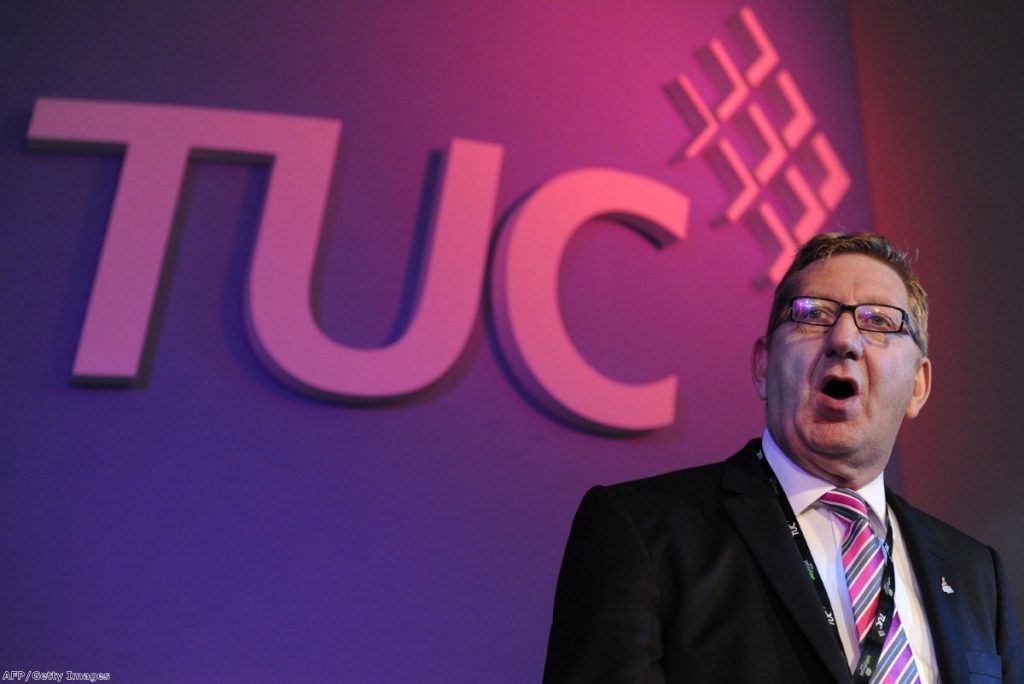Why Miliband should escalate his union standoff
Out of every crisis comes an opportunity. Ed Miliband's decision to stand up to the unions is the moment when Britain's party funding impasse could be resolved.
Such a possibility was unthinkable at the start of the week. On Tuesday, as Tom Watson kindly informed the world yesterday, Miliband was refusing to accept his resignation over the Falkirk debacle. It looked for all the world like the Labour leader would refuse to take steps against Unite. Even in prime minister's questions, he seemed resistant.
And then David Cameron's bludgeoning made something snap. It was the seventh or eighth or 19th time David Cameron had lambasted Labour for its links with the Unite union. Instead of the standard theatrical dismissal, Miliband and Balls' expressions visibly wilted under the strain. Their faces became hard and set. It was the moment when TV chatshow guests conclude the hosts' zany antics are now beyond a joke, and there is nothing for it but to make a dash for the dressing room.
Perhaps that was the moment when Miliband decided, against all his natural instincts, to actually do something about his union problem. He has been sending messages of determination and resolution all day. And he has ended the practice, introduced by Tony Blair, of allowing unions to pay the first year of subscriptions for new members they bring to the party.


The result is open war between Labour and the union which has paid up £8.4 million since Miliband became leader in 2010. Len McCluskey, Unite's general secretary, has declared he is the victim of a "stitch-up" and a "smear". He says the party's probe into events in Falkirk, the constituency whose allegedly dodgy selection process has triggered the row, has been a "disgrace". Labour insists it has sufficient evidence of "misbehaviour" by Unite to justify its actions – and so an almighty standoff is now underway.
The reward for Miliband is clear: he stands half a chance of shedding the idea he is in hock to the unions by firmly standing up for them. But having committed himself so deeply to taking on Unite, he should go much further – and break the deadlock preventing agreement on party funding.
What's needed to reform the miserable status quo, in which the mudslinging at Tory donor scandals and Labour's dubious union links leads to universal loathing from the voters, is a major reform. This would get past the big obstacle of the donation cap, which – depending on the level at which you set it – would leave either Labour or the Tories worse off.
There is a way of fixing this apparently impossible conundrum: having a cap of under £10,000 or so. This is a drastic solution which would leave both parties affected roughly about as much as each other. It would only work, though, if the funding provided by trade unions was counted differently. At present their donations are viewed as corporate ones. If Unite was only allowed to donate £10,000 a year instead of £10 million, Labour's funding would be blown out of the water. If trade union members' contributions were each allowed to count individually rather than collectively, that would change everything.
The problem is this requires a big shift from the trade unions. Right now 14 out of the 15 unions affiliated with Labour don't make it clear on their membership forms that part of their subs will be financing Labour. Only Unison has the kind of tick-box arrangement which gives prospective members the option of opting out. The others, if they do offer an opt-out, make it far from a straightforward process. There's a big difference between ticking a box and having to ring a phone number, or find the information in the small print.
As Unison's continued high levels of donations to Labour shows, being a bit more transparent doesn't hurt too much. Miliband should use this moment to try and present a package of reforms making the unions' party funding link less clear. It has been resisted up until now because the unions fear they would lose their influence on Labour.
Miliband is now in a struggle of wills with Unite in which there can only be one winner. He should expand this battle to the rest of the trade unions and look to achieve a real reform package. He's unlikely to have a better chance before the next general election.

